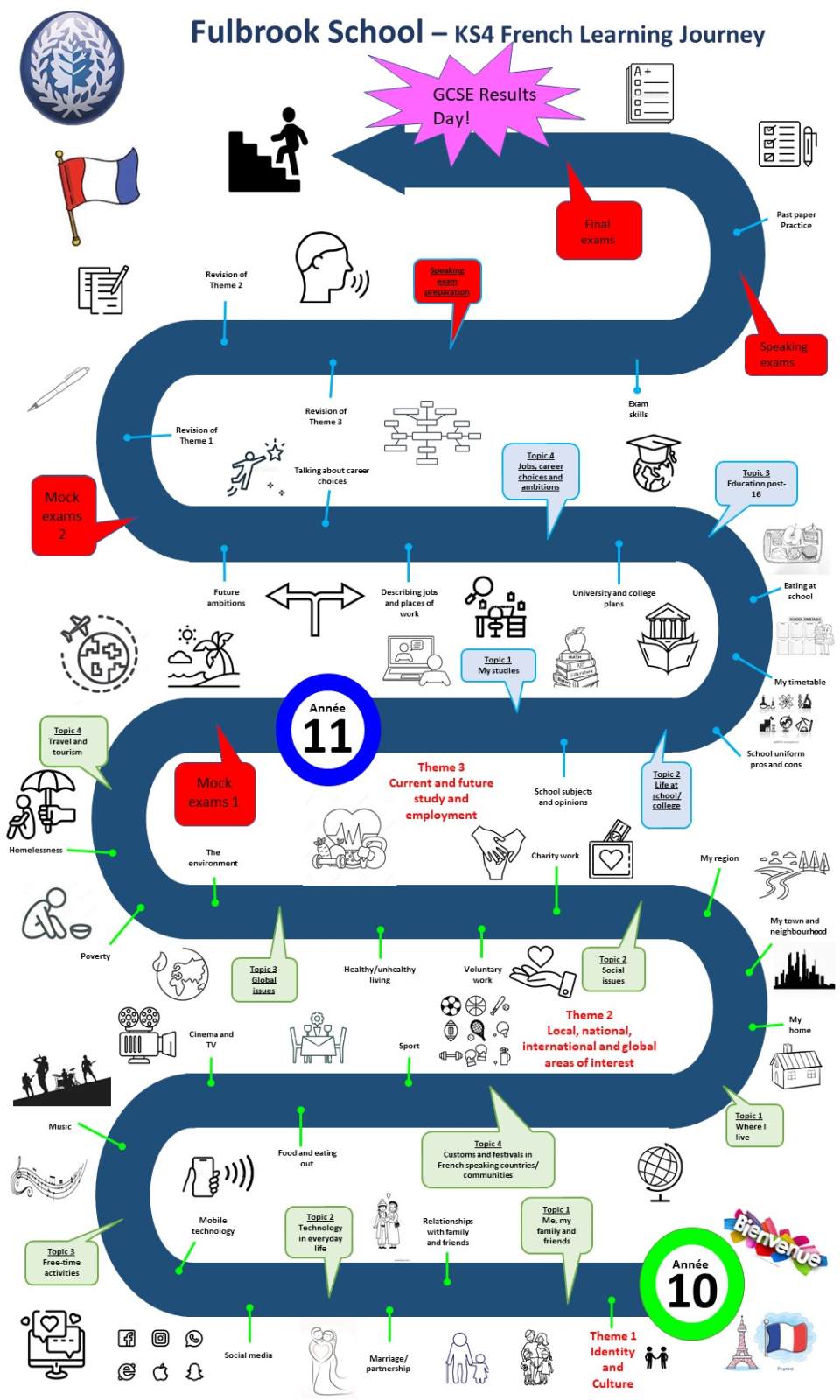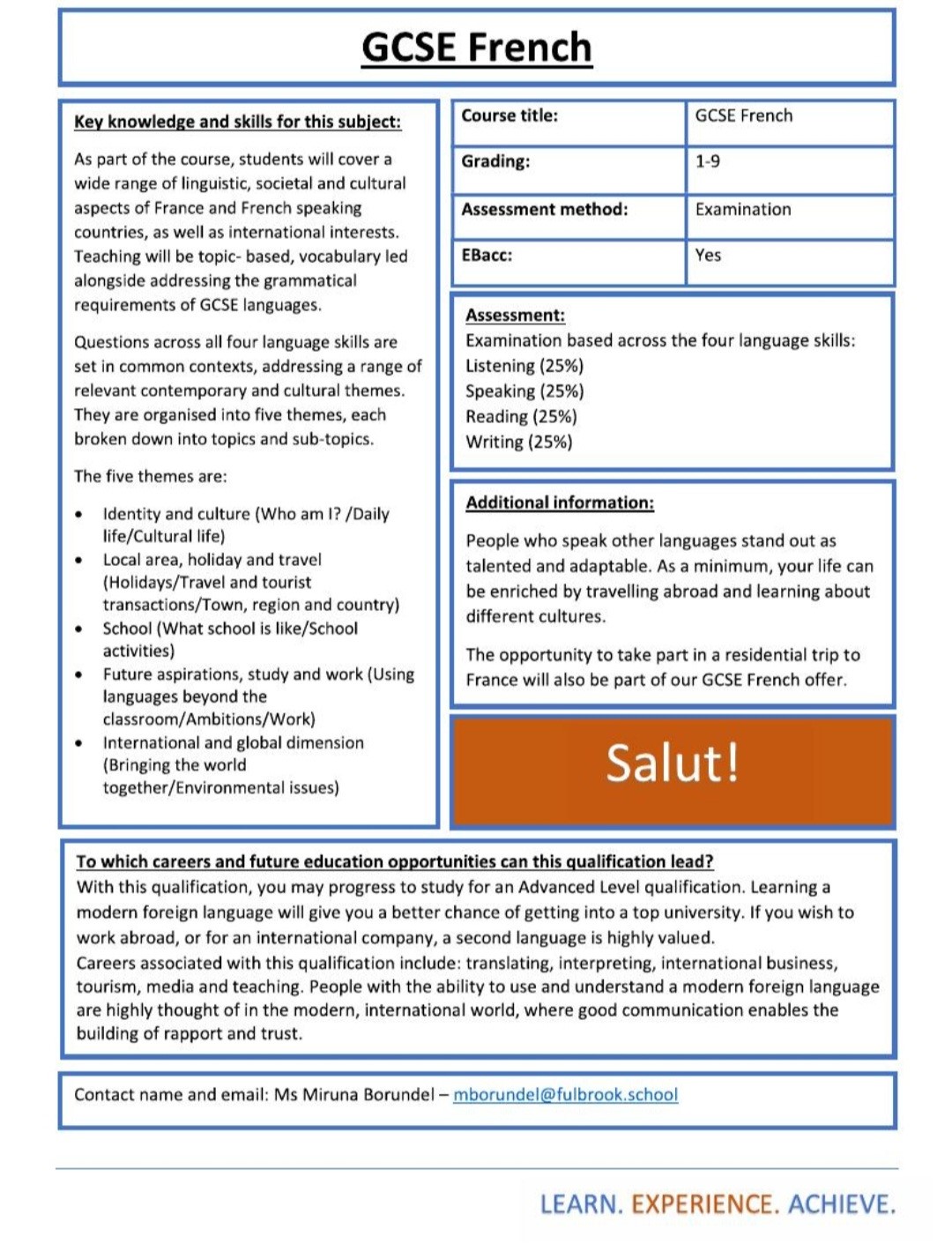GCSE French
Overviews
French Curriculum Overview for Year 10
|
YEAR 10 FRENCH CURRICULUM PROGRESSION OVERVIEW |
|
Subject Curriculum Intent Following the AQA specification, the teaching at KS4 will encourage pupils to develop their ability and ambition to communicate with native speakers in speech and writing and to respond effectively and confidently when reading and listening. The study of French aims to broaden horizons and encourage pupils to step beyond familiar cultural boundaries to develop new ways of seeing the world. Pupils should develop their ability to communicate confidently and coherently, conveying what they want to say with increasing accuracy, automaticity and spontaneity. They should deepen their knowledge about how language works and enrich their vocabulary to increase their independent use of the language. Pupils will acquire new knowledge, skills and ways of thinking through the ability to understand and respond to authentic spoken material. They will develop awareness and understanding of the culture and identity of the countries and communities where French is spoken and will develop language learning skills both for immediate use and to prepare them for further language study in school, higher education or employment. |
|
|
Autumn Term |
Spring Term |
Summer Term 1 |
Summer Term 2 |
|
|
Topic |
Family and Relationships |
Free Time and Technology |
Festivals and celebrations |
Home Town and Region |
|
|
Core/Knowledge |
• Revising family and describing people – revision of present tense(KS3). • What makes a good friend – revision of irregular present tense verbs. • Family relationships – reflexive verbs, comparatives and superlatives. • Making plans to go out – revision of near future, subject pronouns. • Describing a night out – revision of perfect tense and time phrases. • Life when you were younger - imperfect tense. • Talking about role models – revision of all three tenses. |
• Sporting preferences – present tense verbs. • Music – using all three tenses. • TV and Film – opinions and reasons, using sequencers. • Technology – time phrases • Talking about how long you have been doing activities – depuis + present tense • Life online - recap comparative adjectives, relative pronoun que • Advantages and disadvantages of technology – subjunctive. • Reading – recap of imperfect tense. |
• Revising food and mealtimes – il faut (KS3) • Shopping for clothes – recap present tense + adjectives • Describing daily life – using pouvoir + devoir • Food for special occasions – using pronoun en • Using polite language – asking questions with tu + vous • Describing family celebrations – using venir de +infinitive • Describing festivals and traditions – Using a combination of tenses |
• Talking about where you live, weather and transport (KS3) • Describing town and asking the way (KS3) • Describing my region – using the pronoun y • Talking about your town, village or district – using negatives • Discussing what to see and do – asking questions using quell(e)(s) • Discussing plans and the weather – Using the future tense • Describing community projects – using present, perfect, imperfect and future tenses. |
|
|
Assessment |
• Recall strategies used in all lessons, AfL & directed questioning • Phonics + application assessed and revisited throughout lessons to aid fluency and pronunciation. • Vocabulary testing and low-stakes assessments • Summative assessments per term – reading, listening and writing to inform data capture. Assessments based on knowledge covered so far in course. • Y10 mock exam in Summer term includes GCSE-style speaking assessment as well as Foundation/Higher listening, reading and writing |
||||
|
Learning at Home |
Pupils have vocabulary books and knowledge organisers to support learning at home. Vocabulary learning • Reading comprehension/ Translation activities. • Use of online sites such as Language Gym, Active Learn, BBC Bitesize and Seneca to support revision and home learning. • Throughout the course pupils complete key questions booklet which will contains a bank of common questions to support revision for all elements of the speaking and writing exam. Students will be signposted to this for regular revision. • Students purchase revision and support guides to supplement their own study and exam practice. These can be used independently. |
||||
|
Key Vocabulary |
Little words and phrases: * These are words identified by AQA as causing mis-understanding or are not known well by pupils. Literacy strategy used to reinforce these words. parce que/car fermé contre libre partout cependant prêt propre seul/seulement même tôt/bientôt au moins malgré déjà en retard depuis en train de trop |
||||
|
Spiritual, Moral, Social and Cultural Concepts covered |
Autumn Term – Focus on family and relationships, what makes a good/bad relationship, role models and going out with friends – RSE. Benefits of sport and healthy lifestyle, advantages, disadvantages and problems of social media. Spring Term – Festivals and celebrations in francophone countries, home life and comparisons to UK – diversity and culture. Summer Term – Home and region – exploring areas of France, Community projects topic – how people can help their local area. A range of authentic texts used throughout Y10 to explore francophone culture and traditions. Aim to develop links with a French school (2023-2024). |
||||
|
Links to careers and the wider world |
GCHQ events – transferable skills used in Language learning and putting language learning into real-life work-based practice. Links made throughout Y10 to benefits and importance of learning a language for future careers and enjoyment. Anthea Bell competition used to reinforce real-life value of being able to communicate in a foreign language. European Day of Languages events and opportunity to become a Language Ambassador |
||||
French Curriculum Overview for Year 11
|
YEAR 11 FRENCH CURRICULUM PROGRESSION OVERVIEW |
|||||
|
Subject Curriculum Intent Following the AQA specification, the teaching at KS4 will encourage pupils to develop their ability and ambition to communicate with native speakers in speech and writing and to respond effectively and confidently when reading and listening. The study of French aims to broaden horizons and encourage pupils to step beyond familiar cultural boundaries to develop new ways of seeing the world. Pupils should develop their ability to communicate confidently and coherently, conveying what they want to say with increasing accuracy, automaticity and spontaneity. They should deepen their knowledge about how language works and enrich their vocabulary to increase their independent use of the language. Pupils will acquire new knowledge, skills and ways of thinking through the ability to understand and respond to authentic spoken material. They will develop awareness and understanding of the culture and identity of the countries and communities where French is spoken and will develop language learning skills both for immediate use and to prepare them for further language study in school, higher education or employment. |
|||||
|
|
Autumn Term |
Spring Term 1 |
Spring Term 2 |
|
|
|
Topic |
Holidays |
School, Work and education post 16 |
Global and social issues |
|
|
|
Core/Knowledge |
Talking about what you usually do on holiday – using three tenses. • Talking about an ideal holiday – using the conditional • Booking and reviewing hotels – using reflexive verbs in the perfect tense. • Ordering in a restaurant – using en+ present participle. • Talking about travelling - using avant de + infinitive. • Buying souvenirs – using demonstrative adjectives and pronouns. • Talking about holiday disasters. |
• Talking about school – using pronouns • Comparing school in the UK and French-speaking countries. • Discussing school rules – using il faut + il est interdit de • Discussing healthy living – using the imperative • Discussing vices – using present and future tenses. • Talking about a school exchange – using all three-time frames. • Discussing career choices – saying better/worse etc. • Talking about future plans, hopes and wishes – understanding the subjunctive • Applying for jobs – using direct object pronouns in perfect tense. • A job in tourism – verbs followed by à or de.
|
• Discussing problems facing the world • Talking about protecting the environment – using modal verbs in the conditional • Discussing ethical shopping -using the passive • Talking about volunteering – using indirect pronouns • Giving arguments for and against large events. |
|
|
|
Assessment |
• Recall strategies used in all lessons, AfL & directed questioning • Phonics + application assessed and revisited throughout lessons to aid fluency and pronunciation. • Vocabulary testing and low-stakes assessments • Summative assessments per term – reading, listening and writing to inform data capture. Assessments based on knowledge covered so far in course. • Y11 mock exam in Autumn and Spring term at Higher/Foundation level including a full mock GCSE-speaking exam in January |
|
|||
|
Learning at Home |
Pupils have vocabulary books and knowledge organisers to support learning at home. Vocabulary learning • Reading comprehension/ Translation activities. • Use of online sites such as Language Gym, Active Learn, BBC Bitesize and Seneca to support revision and home learning. • Throughout the course pupils complete key questions booklet which will contains a bank of common questions to support revision for all elements of the speaking and writing exam. Students will be signposted to this for regular revision. • Students purchase revision and support guides to supplement their own study and exam practice. These can be used independently. |
|
|||
|
Key vocabulary |
Little words and phrases: * These are words identified by AQA as causing mis-understanding or are not known well by pupils. Literacy strategy used to reinforce these words. partout sembler avantage/désavantage vers chez aussi … que pas mal de surtout peu /un peu de près plutôt presque sans pour sauf pourtant pressé |
|
|||
|
Spiritual, Moral, Social and Cultural concepts covered |
Autumn Term – Places in France, tourism and types of holiday preferences, buying tickets – life skills! Resolving issues – ie. complaining in a hotel. Spring Term – CIAG – work, careers and further education. Social and environmental issues explored and discussed – what we can/should do to help people and the environment. A range of authentic texts used throughout Y11 to explore French-speaking culture and traditions.
|
|
|||
|
Links to careers and the world of work |
GCHQ events – transferable skills used in Language learning and putting language learning into real-life work-based practice. European Day of Languages events and opportunity to become a Language Ambassador. Spring Term – Jobs/careers and post-16 plans and the value of continuing to learn a language for future study/employment.
|
|
|||
Click to download our French Curriculum Overview for Year 10 Click to download our French Curriculum Overview for Year 11
Key Stage 4 French Learning Journey
 Click to download our Key Stage 4 French Learning Journey
Click to download our Key Stage 4 French Learning Journey










